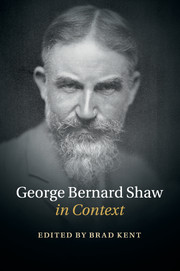Book contents
- Frontmatter
- Dedication
- Contents
- List of illustrations
- Notes on contributors
- Preface
- Acknowledgements
- A Chronology of Shaw's Works
- List of abbreviations
- PART I PEOPLE AND PLACES
- PART II THEATRE
- PART III WRITING AND THE ARTS
- PART IV POLITICS
- PART V CULTURE AND SOCIETY
- 31 Celebrity
- 32 Education
- 33 Evolutionary theory
- 34 Health and vegetarianism
- 35 Language
- 36 Nature
- 37 Philosophy
- PART VI RECEPTION AND AFTERLIFE
- Further reading
- Index
- References
35 - Language
from PART V - CULTURE AND SOCIETY
Published online by Cambridge University Press: 05 October 2015
- Frontmatter
- Dedication
- Contents
- List of illustrations
- Notes on contributors
- Preface
- Acknowledgements
- A Chronology of Shaw's Works
- List of abbreviations
- PART I PEOPLE AND PLACES
- PART II THEATRE
- PART III WRITING AND THE ARTS
- PART IV POLITICS
- PART V CULTURE AND SOCIETY
- 31 Celebrity
- 32 Education
- 33 Evolutionary theory
- 34 Health and vegetarianism
- 35 Language
- 36 Nature
- 37 Philosophy
- PART VI RECEPTION AND AFTERLIFE
- Further reading
- Index
- References
Summary
‘In the beginning was the Word, and the Word was with Shaw, and the Word was Shaw’. This biblical paraphrase contains the most precise synthesis of what is to follow on the relationship Shaw had with language, such was their inextricability. To begin with, Bernard Shaw was born to a family whose members – and the circumstances derived from the lack of affection thereof – saturated the young boy with a wide range of linguistic and literary materials. For instance, his father and his mother's brother, Uncle Walter, would exudate biblical idiom flippantly, a practice, wrote Shaw, that proved ‘effective in destroying all my inculcated childish reverence for the verbiage of religion, for its legends and personifications and parables’, but that propelled Shaw to a vast knowledge of religious texts. In addition to religious idiom, he knew his Shakespeare by heart from an early age, to the extent of being more acquainted with some of Shakespeare's characters than with many of his living contemporaries; in fact, he recalls ‘no time at which a page of print was unintelligible to me’. To cap his childhood education, the scarce but terribly boring time he spent at school made him seek escape in the works of a motley corpus of writers: Bunyan, Dickens, Scott, Lever, and Dumas. Such unusually learned readings and ‘his command of long words gave him an air of maturity that appealed more to adults than to children’. In the end, after all the hurt pride of his shabby genteelness and the inadequacy of his relatively modest upbringing, Shaw could only claim to have moved to London with a single weapon in his arsenal: ‘the English language’, whose entire vocabulary was ‘completely and instantaneously at my call’.
In statistical terms, by comparison with Shakespeare, the yardstick by which literary genius is measured in English literature, Shaw's vocabulary comes out as the wealthier: all of Shakespeare's plays and sonnets contain a little less than 26,000 different words, to Shaw's 28,400. Even the fact that Shaw's dramatic canon is somewhat larger (roughly 1,050,000 to 880,000 word tokens) highlights the richness of Shaw's language, since both authors have a practically identical type/token ratio, a measurement of vocabulary variety, of three.
- Type
- Chapter
- Information
- George Bernard Shaw in Context , pp. 289 - 296Publisher: Cambridge University PressPrint publication year: 2015
References
- 2
- Cited by

